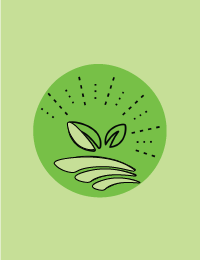Name of Organization: Chudnata gradina (“Wonder Garden”), agricultural social enterprise operated by “Saint Nicholas the Wonderworker” foundation.
Region of Operation: Dobrich
Size of cultivation: 0,4 ha
Number of employees: 22
This company is unique for it is considered to be the biggest and best developed social enterprise in Bulgaria. The farm was launched less than two years ago in an abandoned lot near Dobrich main street. The founder is the non-profit organization “Saint Nicholas the Wonderworker” which CEO Mrs. Maria Metodieva was actively seeking for employment opportunities suitable for intellectually challenged adults. The land was provided by the municipality and the noble endeavour soon draw many supporters. As for now, several public institutions, private companies and individual sponsors are providing assistance in various ways: the water for irrigation is paid by Dobrich municipality, a local investor donated an automobile for transportation of produces, etc. Families and friends are also involved in the daily work of the garden as volunteers.
The farm employs 22 men and women with different degree of intellectual disabilities. For some of them this is their first job and sole chance towards independence and social acceptance. Unfortunately, in Bulgaria the degree of inclusion of people with disabilities, especially concerning mentally impaired persons is very low. In practice they are shunned from the society. Some of them are deprived of human rights via so called “guardianships”. The mission of the “Wonder Garden” founders is to fight on their behalf by working towards changes in the existing policies and jurisdiction. As a result, several guardianships were removed, enabling people to gain personal independence and social status.
Upon its start the garden inherited an overgrown plot of land with wild shrubs and hedges, stony foundation and scarce soil coverage. The land was cleaned by heavy construction machines and new soil was piled on the empty spot. Thanks to the perseverance and dedication of employees and social workers the plot was miraculously transformed. Today, it has four neatly built green houses, 200 sq. m. each which are used for early vegetable production (mostly tomatoes, cucumbers, lettuce and herbs) and as a nursery for the young seedlings.
On the open areas, three variety of white cabbage are grown and a specially designed irrigation system is constructed. Bio wastes, grass and leaves clippings are piled in a large composter intended to be used for enriching the existing soil.
The garden is operating for very short time, but the success is more than evident. The produce output is growing considerable and the vegetable harvest is abundant each year. The farm has won the trust of the local community, and residents of Dobrich and the nearby towns and villages are loyal clients of the company. They are motivated not only by the noble cause which stays behind the enterprise, but also by the excellent qualities of the produce. The farm in practice has ensure the market for its production by repeated customers and gross sales to several bigger institutions (such as Dobrich municipality) and restaurants. Despite this success, the revenues from sales are not sufficient to provide for the workers’ compensation and the managers are constantly applying for participation in programs for state assisted employment.
The founders admit that their focus is providing social services to disadvantage groups of people, rather than developing a prosperous agricultural business. They have found that farming is an excellent match for providing opportunity for developing various skills and competences. The employees have advanced greatly in terms of professional aptitude since their first day of work. Their performance has exceeded even the most optimistic expectation. They have developed expertise in farming, landscaping and greenhouse construction as well as soft skills for team building, work ethic, responsibility and discipline. Here, the people with intellectual disabilities has found a safe environment which encourages personal growth and social acceptance. As social inclusion is one of the CSA pillars, this farm is an excellent example of CSA best practice by providing numerous benefits and employing innovative approaches in a sustainable way such as:
- Social inclusion and providing employment opportunity for marginalized people
- Application of the principles of conservation agriculture (minimum mechanical soil disturbance/ no tillage; permanent soil organic cover with crop residues, etc.)
- careful selection of crop variety and seeds. Various sorts of vegetables and seed providers were tested in order to choose the best match for the particular soil and climate
- spare use of fertilizers and minimal use of pesticides. The weeding is done mostly manually since it is a part of the therapeutic activities and help developing physical stamina
- crop diversification by including more vegetable varieties, legumes, greeneries and flowers
- Ingenious irrigation scheme where water is transported in cisterns from distant natural springs. The water has undergone checks for health safety and environmental cleanness
- Soil amelioration techniques including usage of natural fertilizers, “lasagna layering” and composting of organic wastes.
- Protected growth in greenhouses to combat pests without chemicals and maintenance of the optimal temperature and humidity
- Direct sale to the end consumer and constant communication (via social media or regular PR activities)
